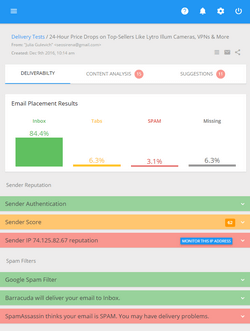Can You Send Targeted Opt-Out Emails?
Almost every book or article on email marketing tells us that permission is the guarantee of successful and long-term relationship with the subscribers.
But the tough times we’re surviving now may force some email marketers to send their bulk emails to those people who didn’t give the consent to receive them.
I don’t mean random spam that is flooding our Inboxes every day.
What I’m talking about is targeted opt-out emails. This is when a contact is not subscribed to the list but the sender has some information about the contact that suggests the email may be relevant to him or her.
For example, if the subscriber owns a business, he may need advertising services. If he owns a website or blog, he may need more traffic. If he has a pet, he may want to know more about pet care and food etc., etc.
So, are targeted opt-out emails really relevant, valuable and legal?
I’m sure you heard a lot about email relevancy and value in email marketing. A good email marketer is one who is sending emails relevant to the subscriber expectations and who is offering valuable information in the emails.
With that said, opt-out email followers say that it’s OK because their emails are relevant and may be of interest to those people. I think they are right and they are wrong. Here is why…
Let’s look at our examples. If I know the subscriber has his own business, it’s reasonable to suppose he needs help from advertisement services to promote his business or products. From this point of view, there is nothing wrong with sending him an email telling about such services my company provides even if he is subscribed to a quite different email list.
But the problem is this is based on my assumptions only. We incline to overestimate the relevancy and value of our emails. We are convinced that our product or service is so great that everybody would want to know about it.
The reality is different.
Whatever information we have about our subscribers, we cannot exactly know or guess what they are interested in. Some will welcome your email and you will get some more customers while others will treat it like spam. So, on my opinion opt-in emails work better.
I won’t assert that opt-in emails are always relevant and valuable. But they are sent to people who self-identified their interest by subscribing to the list. And this is an argument in favour of opt-in emails.
That was an ethical side of the question. And now let’s look at the problem from the technical point of view.
Anti-spam legislation requires an opt-in list for commercial email. So, in case of any deliverability issues you can get help from anti-spam databases, feedback loops, etc.
Opt-out email practices don’t guarantee any deliverability help.
Moreover if you are using an email service provider (ESP) instead of desktop email marketing software, they may not allow you use their system to send bulk opt-out emails.
I will make no secret of the fact that sending opt-out email campaigns can bring some positive results: more sales, downloads, new subscriptions, etc.
But we should also think about the negative effects caused by opt-out emails. The problem is that they are not so obvious or instant. But they are real.
“I’ve been doing it for years and nobody has complained yet” is a popular opinion among opt-out email followers.
Spam complaints may not always go directly to the sender. People may complain to the ISP or ESP. If you are not signed up to the ISP feedback loops, you won’t know about those complaints. And while you are enjoying a new sale, your good sender reputation and future email deliverability may be slowly but steadily approaching their decline.
So, as you see there is no definite answer whether targeted opt-out emails are relevant and legal. What your email is – opt-in or opt-out – you are likely to receive a variety of responses. Some subscribers will love it and respond positively. Some will stay indifferent. Others will think you’re a spammer.
But the further you deviate from good email marketing practices, the more “you’re a spammer” responses you’ll get with all the ensuing consequences. And opt-out email is far away from the permission based email marketing.
Anyway, it’s your list and your brand reputation so it’s about you to decide. But before making a decision, ask yourself this simple question “If I send this email, will they think it’s spam?”
